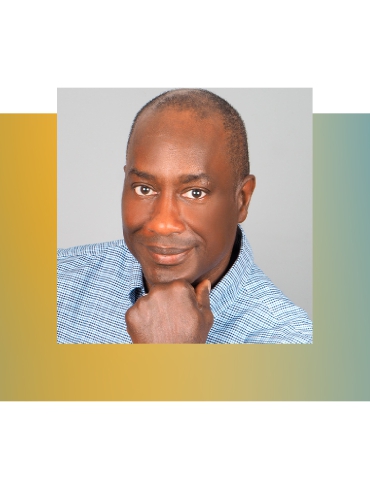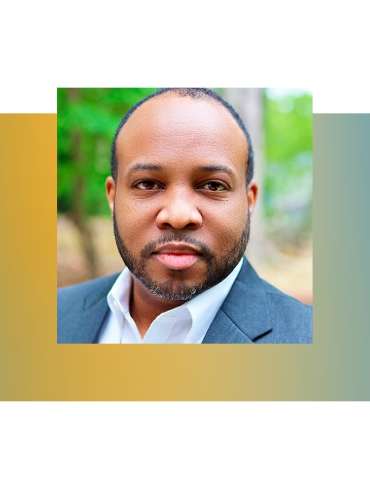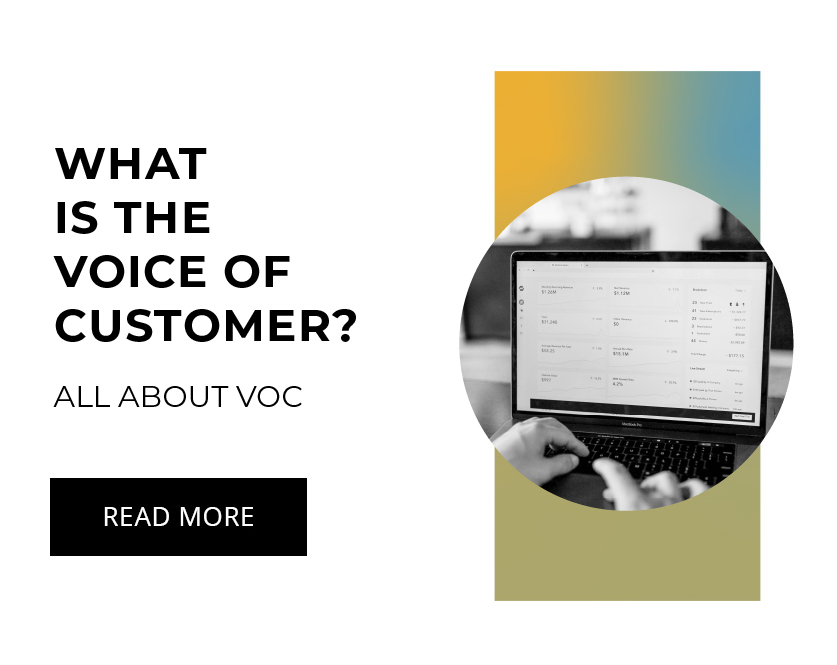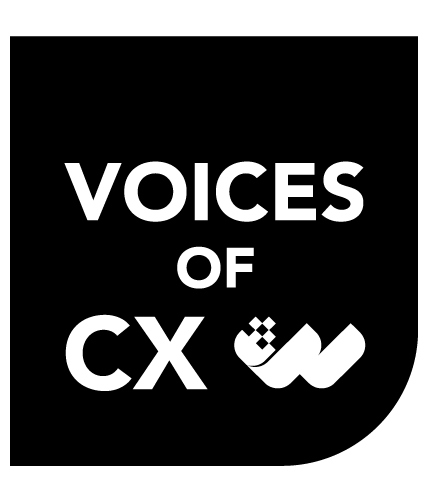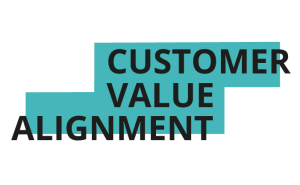Jill Raff joined us on Season 8 of the Voices of CX Podcast to talk about the full value of the employee experience, how it directly impacts the customer experience, and how the past two years have highlighted just how rough front-liners have had it.
And we did it live! Check out our guests’ beautiful faces below:
About Jill Raff
Jill Raff is the globally recognized EX2CX™ Expert, amongst the Top 150 Global Customer Experience Thought Leaders and Influencers, who works with executive leadership who recognize the paradigm shift due to the pandemic; the non-negotiable creation of a more humanized culture prioritizing their people.
She helps organizations that now acknowledge their people are their greatest asset, but need help creating new systems and procedures to develop the culture which exhibits this core value resulting in higher retention and greater productivity for a true collaborative team. Jill works with organizations to achieve the reward of employee and customer lifetime value through her methodology connecting the employee experience (EX) to the customer experience (CX)- EX2CX™.
While many professionals talk about the customer experience – Jill Raff has lived it from day one. Jill grew up working with her parents, owner/operators of one of the first McDonald’s franchises in the world, store #150. Her customer service philosophy originated from observing her mother and father’s work and their interactions with legendary founder, Ray Kroc. EX and CX is in Jill’s DNA. She helps owners and executive leadership Turn Employees Into Advocates and Customer Magnets.
Follow Jill Raff on LinkedIn
Follow Jill Raff on Twitter @ex2cx_expert
Check out Jill Raff’s CX Checklist
Connect with the Voices of CX
Follow Worthix on LinkedIn
And Follow Worthix on Twitter: @worthix
Follow Mary Drumond on LinkedIn
And Follow Mary Drumond on Twitter: @drumondmary
The Voices of CX Podcast is a podcast that covers all things business strategies, customer decision insight, empathetic leadership practices, and tips for sustainable profitability. With a little bit of geeking out on behavioral science, A.I. and other innovation sprinkled in here and there. The guests span multiple industries, but all of them have years of experience to bring to the table.
Got something to say about CX or want to be featured on the show? Let us know!
Email the Producer ([email protected]).
Transcript
Mary Drumond: Welcome to Voices of CX season eight, as usual, bringing you the very best thought leaders, practitioners, and academics all in one place. Our goal is to make your job easier by providing you with the tools and inspiration that you need to lead through empathy, one new idea at a time.
Ladies and gentlemen, welcome back. I am very lucky in season eight of Voices of CX because I’m having all these guests on that I actually really enjoy as people and it makes me really comfortable. So I’ll sit here with my legs up and just kind of chill and have a conversation. Today I’m welcoming Jill Raff to the show. A person I absolutely adore, love her point of view, from the very first time we spoke, we connected instantly.
So Jill I’m so happy to finally have you on, say hi.
Jill Raff: Thank you. It’s so great. I feel the same about you and it’s really great to be with you. I always love speaking with you about anything, but – and we shared so much in common as we learned, but especially around our passion of the voice of the customer and from my perspective, the internal customer, as well as the external.
Mary Drumond: Yeah. So let’s start off by giving the folks at home a good idea of who you are and what you do on your day to day, what you’re passionate about in your job.
Jill Raff: Sure. So, professionally, I’m an EX2CX strategist, which means employee experience to customer experience because I believe 100% that in order to have outstanding customer experience, you must first have outstanding employee experience.
The people who are delivering your brand promise, the people who are frontline, frontline sounds like it’s a war, but you know, people who are the first line interacting with your customers. They have to be happy. They have to be invested and committed into what your company is about and the culture.
And when you do that, for sure, you’re going to guarantee long retention, increased revenues, great reviews and ratings. I mean, you’re going to have a successful business that you can also scale.
Mary Drumond: That’s great. And it’s so relevant right now. You know, the first time we spoke was in the middle of the pandemic and everybody was working from home and we really didn’t know what was going to happen.
And as the vaccine rolled out and things started changing. We realized that there’s actually a crisis in the market when it comes to employees, how they feel treated by organizations, what they prioritize, what they value. And this has put such a huge focus on employee experience and exactly what you do.
So I imagine that this is a busy time for you, is that right?
Jill Raff: It is. It’s pretty crazy because, you know, as you know, staffing is a problem and I’m sure we’ll get to that later, but it’s become a kind of a catch 22 that people want to be working on their business. But what I’ve found is that these business owners are working in their business and they are just swamped.
And they realize now for the first time, as you said, COVID really highlighted the importance of the people aspect of their business. It’s not just processes. It’s not just the systems. You need the people behind it for these things to come to life. And so, super, super important that – I’m sad that it’s taken COVID for business owners and executive management and leadership to recognize this, but the truth is, I’ve been saying this for so long from my upbringing and what I’ve learned, to recognize your people first and the rest will fall in suit.
Mary Drumond: So, we don’t need to put it off. We can talk about this right now. Let’s talk about the staffing problem that’s going on. Of course there are multiple hypotheses about why the staffing problem is so critical right now. Lots of people are blaming unemployment benefits or stimulus and other things like that, but that’s just a symptom, right?
The true cause is a lot deeper. What’s your perspective? What’s your take?
Jill Raff: I think you really hit the nail on the head and talking about it, being a symptom. So often when I speak to my clients, they’ll tell me about a problem. I’ll say, you know, what’s keeping you up at night, what’s your biggest problem.
And they’ll tell me whatever’s going on. And I’m like, you’re right. This is really a problem. But in fact, it is a symptom of what the real cause is. And in my mind, the real cause is these companies have not created a culture. They have not defined clearly their core values, their mission, and their vision to incorporate the importance of their people.
And if you don’t have that as a foundation, as the cornerstone of your business, then anything that follows will create – you know, you could have success for a short term, for sure. But if you want sustainable business, you have to have a solid culture that where your people feel and understand that they are appreciated.
That they’re a part, and they are the reason for the success and that at the end of the day, when they feel they have meaning, when they feel like they’re invested in what’s going on. They’re going to take ownership and pride of the work that they do. And if you don’t have that, it doesn’t matter how much you offer them.
It doesn’t matter what benefits you give them. All of that, people care less about. At the end of the day, they want to be a part of something that matters, and that is meaningful, that they can contribute to where they’re recognized and acknowledged and respected. And that is ultimately the problem.
Mary Drumond: Yeah.
How much do you think, and I’m going to …philosophize a little bit right here, because I’m thinking about the century-old debate. Where you’ve got that element of white-collar versus blue-collar mentality, where the people who are making the decisions are so far removed from the folks who are putting in the hours. And this creates a separation and a feeling of alienation on behalf of the staff that truly is not showing up to work at the moment.
I believe – correct me if I’m wrong, Jill, that the big crisis is happening with essential workers. It’s not happening with office folk, it’s not happening with executives. It’s happening with frontliners, it’s happening with hospitality, it’s happening with manufacturers. It’s happening with the folks who have been undervalued and underappreciated for a really long time. You know, I saw this meme on the internet the other day, it was talking about how office workers tend to feel so superior to people who practice a trade. When in fact there is so much value to having a trade.
You know, so, you know, one of the things that I was seeing is, an entry-level office worker who makes $35,000 a year sitting here feeling high and mighty versus a plumber who makes plus 200K and it’s so ironic, but how much do you think it has to do with that lack of empathy between the executive force and let’s say the wages force.
Jill Raff: Wow. That is definitely an age old problem that we face. I’m hoping that during this time that sadly, this pandemic has really level-set that we are all the same, right? The virus doesn’t recognize what job you have, how much money you make, what color you are, what religion, what God you pray.
Doesn’t care. Right? So I’m really hoping. I always try to find the silver lining and it’s just been a terrible crisis, but I hope that it will help humanize again. I keep coming back to that word because I think that businesses need to be more human centric, but I hope that it will humanize our world and all parts of our lives personal anonan every level of business from the dishwasher or the guy, you know, cleaning the floors, the maintenance guy, to all the way up to the executive level and up to the ownership and to the tradespeople and recognize that we are all the same and we all have value to offer. And in fact, it’s, when you look at what is the value of that person, where is their genius?
And we tap into that regardless of where they come from, what their income level is, et cetera. Even their educational level. People have things to offer and value that we would otherwise not know because we haven’t had their life’s experiences and we all bring our own life experiences to the picture, that are different. Which is what makes this diversity and inclusion so important of what’s going on in the marketplace now and why it’s so critical to have a true microcosm in your business of the bigger world. And I think that when we stop judging based on what someone’s being paid, right?
Like it’s not even their choice when someone’s chosen what to pay someone that they’re defining them. No instead, I think we need to look at truly the value and experiences of each person and pull from each one. What is your best offering? What is your best zone of genius? What do you do best? Your 20% that might be a part of my 80% that I could do, but doesn’t mean I should do. That I don’t really like it. So I’m not as good at it where they are. And then everyone’s doing the best thing. Getting the right seats in the bus for the right task will increase productivity and efficiency in your business a 100%.
Mary Drumond: Yeah. Another thing that I think could contribute is the fact that essential workers in general, just burned out. You know, while all of us were sitting at home feeling really, really smug while posting, “staying at home saves lives,” on our social media, these folks were out there every day, exposing them – putting themselves in harm’s way, before we even knew what the true causes of the virus were, how to stop it, how to protect ourselves.
They were out there. And they – I believe that during that very critical moment where those folks all really rose to make sure that society continued to function. Even in that dire time, we still did not give them the appreciation and the value that they deserve. And I think that’s what led people to just say, why am I doing this anyway?
What’s the point? And I think that’s where it really comes into understanding how leadership and how culture and appreciation and showing value is in so many cases, more important than money. Money is definitely important and it’s essential. It shouldn’t even, I don’t even think it should be factored in that much, but the added value I think, has become so much more highlighted at this moment.
What do you think?
Jill Raff: Yeah. Yes. And statistically, they’ve actually done studies on this and they have shown that people are willing to work for less money. People are willing to work overtime. Imagine so that – right, you’ve got both sides, they’re working for less money and they’re willing to also put in more hours when they feel committed and that their contribution is valuable and appreciated.
And those are such simple things to express to your people. Appreciation is simple things like recognizing them through, looking at them in the eye, calling them by their name. A simple thing, but wow. The endorphins that hit when someone hears their name, right? Like it’s amazing and saying, thank you, you’re doing a great job.
And even if someone messes up say, you know what, I know you’re really committed. I know you really are working hard. Let’s see what we can do together. So again, you’re showing that you’re engaged with them. You’re invested in them a hundred percent. People will go so far for you. It’s our human nature I think that we want, you know, it’s the law of reciprocity, right?
The universal law of reciprocity. You do right by me, I’m going to naturally feel compelled to turn around and do something for you. And not that it’s calculated in that way, but if we just tap into the human side of business, which is these components of all of our personalities, regardless of our experiences and where we’ve been raised, you tap into that human soft, wonderful warm center.
And when I say soft, it’s not weak, it’s this beautiful place of humanity. Then you’re going to have connection also within your people. And when your people are connected, they’re going to naturally want to support one another. And when you have a supportive team, you have a team of collaboration and one that’s going to be much more productive. So 100%.
Mary Drumond: Yea I think that so much of leadership is understanding what drives your people to stay with you.
You know, here at Worthix we use decision drivers to understand purchase decisions, but the concept behind it can be applied to any decision. So why are people choosing to work with you instead of working for a competitor or instead of choosing a different field or in this market, instead of staying home. Right? Why are people making this choice? What are the aspects of the experience that they have with you as employees that’s making it worthwhile to them? That’s making them get out of bed in the morning and arrive at work on time and show up with their best selves. Is it money?
In many cases, there are a lot of jobs out there that I’m sure it’s about the money, because it’s a matter of survival, but there are others. It’s about cultures, it’s about families, it’s about a feeling of belonging. It’s a feeling of the satisfaction of creating something, of improving something in many cases. Like for teachers, it’s a calling, right? You’re fulfilling that calling. So I think that for leaders to be able to understand what intrinsically motivates people to come in and show up and do the job is so important to creating the right culture because you can say, oh, I’ve got great culture in my organization.
Great culture for whom? For yourself, for your own interests, for the interests of the board? Or for the interests of the individuals that are showing up and getting the job done. Right? So in the same way that in customer experience, we try to understand what motivates the customer to buy from us. And the idea of customer-centricity is that we put the customer in the center and not the organization.
In the case of the employee, having that empathy, where you can see things from the other perspective, so that when you design the employee experience, when you design the career path or the stimulus or the rewards and the benefits that you’re providing your people with things that actually matter to them, right?
Wow, that was a long rant.
Jill Raff: Yeah, no, no. So you’re so spot on and how passionate you are about it. Absolutely. You know, I’ve learned from clients that are dealing with staffing problems, getting the right people on board. And then, of course, turnover is a massive problem. And at one point, one of my clients was telling me all the things that she does.
We’ve given – you know, throw money at them. We’ve given them more money. We’ve given them all these bonuses and we’ve given them fun bonuses as well. We’ve given them all these benefits. And I was like, okay, let’s step back a minute. I don’t think your problem is that you’re not giving them enough money, bonuses, benefits. In fact, you might be giving them too much.
It’s like raising a child, right. You spoil them, and you give them all these things. You’re creating an entitled employee. And what in return are you asking and expecting and holding accountable from these people? I said your problem isn’t that. Your problem, you have a hiring problem. You’ve hired the wrong people who don’t have the character and appreciation and values to understand that what you’re doing, isn’t just like candy. It’s to reward you for something. And they’ve really missed that component. And they’re really trying hard. And one of the things that I did was work with them on creating that employee engagement, in order to increase their retention and, you know, it made me think too, because – made me think about my dad.
So my parents and grandparents were McDonald’s owner-operators of store number 150. So I come from the early days of that franchise, long before it was the number one global hamburger franchise. But there were values in place. There were expectations and accountability, and I’ve been having conversations.
And just this week, recently reconnected with someone else who worked for my dad in – so the one store that opened on Macon Road in Columbus, Georgia was in 1962 and he worked there from 64 to 66. And then again for a short time after he came back from the Vietnam war in 69, and we reconnected, we connected on Facebook.
He remembered not only my parents’ names, of course, but my grandfather’s name and his involvement, the corporate name of the store, it was Mister and Me and I was like, oh my gosh. He’s like, I paid attention, I saw what was written on my checks. But he remembered all these details and we just had this interview, and it was so heartwarming and it was incredible to me because I thought these are the things that are missing today. And he talked about that it was a family, that your father respected me. And as a 17, 18-year-old, like, that’s pretty amazing. Like you don’t usually find places where the owner is respecting you and showing you that respect.
He would be shoulder to shoulder working with us if something came up. He said he’d never ask me to do anything that he couldn’t do and didn’t do himself. Like, so there are all these little gems that came out and then he said we were a family. We supported each other. And that’s what’s amazing, is to create that work environment, that human-centered environment, that really feels like a work family.
And I just believe so strongly in that. And I think a lot of it has to do with the fact that, he was made to feel important. He was made to – it was clear to him that his contribution mattered and his input was taken. And these are the things that are missing I think today to create that commitment from the employees.
Regardless of the level of where you are in an organization.
Mary Drumond: Yeah. I think that we could talk about this for another two hours without missing a beat, but I did want to change the topic a little bit, because there’s something really important that I wanted to get into right now. And I think it’s really hyper relative to this moment that we’re going through in the market.
And I recently heard some news about remote workers taking on second jobs. Now, this isn’t part-time individuals who are working two jobs. These are salaried 9 to 5 workers who are simultaneously working two remote jobs. Now there is an ethical debate there. But there is also the very, very saddening aspect of it, which is that in order to make ends meet, people are having to split their day in half and do two things at the same time.
Share a little bit of your point of view on this Jill. And what do you think, what are your perspectives? Is it right or is it wrong? Do you believe that that’s one of the reason why certain companies are still really hesitant in allowing people to continue working from home?
Jill Raff: Oh gosh. So much in that.
It is, as you said, I think it’s devastating. I think it’s a really sad statement of what’s going on today. And the value and recognition and salary of workers, that they feel the need to take on another job while they’re doing something else a hundred percent. Now clearly, you know, I think back, right, to days after the war, right.
Or the depression where you would – or families, even now, today, where you hear these stories where people are working in these hourly wage jobs, and they’re having to take on two and three to take care of a family. Nobody would choose that type of work, of lifestyle if they didn’t have to. And so, gosh, yes, there’s that whole piece of the ethical side of it, right? Like you’re working for someone they’re paying you and you’re now, during that time, also working for someone else. And so, gosh, so many things, my brain’s racing.
Mary Drumond: It’s a lot to unpack.
Jill Raff: Yea, try to be systematic about this. So on one side, you know, I think if the person is efficient and they’re producing what’s expected of them, then good for them. They’ve learned to be really productive and work smart and not work hard. And if they can do that and take on something else, because that’s what they need to do to pay their bills, their mortgage, their groceries, get school, whatever it is, then who are we to judge?
If they’re falling short of their responsibilities, then of course, I think that takes on a whole other side, right? And at the same time I would ask why is a company not paying them what they’re valued at, what they’re worth, so that they wouldn’t need to go out and get that second gig or third or whatever it is.
You know, there’s so many components and it really depends upon why they’re doing it. Is it a purely financial reason? Is it boredom? You know, maybe they’re not being challenged by their company. There’s so many things, so many ways you could take that. It’s definitely a big challenge, and I think one that’s evolving. And there are so many factors, I think you just kind of have to look at things, case by case. What are your thoughts?
Mary Drumond: You know, it’s complicated for me because I am personally, my personal stance on working from home is that I don’t fit the profile. I really feed off of inner office interactions.
I could not wait to get back into the office. And, you know, as many women, many mothers out there, when I’m home, I’m constantly preoccupied with the dishes, with the laundry, with the dogs, with cleaning, with all of these other things that are constantly pulling me away from my work. And when I’m in the office, all of my mental energy, all of my focus, all of my attention is on getting the job done. The conversations that I’m having are work-related conversations, and I really feel like I’m a million times more productive when I’m surrounded by the energy of my coworkers, of my team.
This is not to say that working remotely isn’t a really good option for a lot of people. I was watching this old interview, that was talking about the creation of the computer. And it was Steve Jobs discussing the future in his mind, now that we had personal computers and what would – this would empower organizations and workforces to be like? And the truth is that that future is now, where we can have different, how could I even say this, that teams don’t have to be unified in one location in order to be productive and you can pull talent from all over the world.
That’s extremely valuable. Again, not my case, in my case, at my job in this company that I work for, we produce more when we’re able to work together. So we found it important to bring the team back as soon as it was safe.
And I don’t feel like the core team is able to bring the same energy, the same culture when working remotely. But I think we’re going to have to adapt. I think that we’re going to have to find ways to bring that culture, extend that culture, to teams that work remotely, to individuals who work remotely.
And if you are the type of person that is able to have that focus and buckle down and get it done, then I don’t see why you shouldn’t work from home. If your job, if your position, if your team allows you to do so. And I think that there is this big debate around companies bringing people back and folks preferring to quit their job, as opposed to coming back into the office.
My personal belief, and I could be totally off here, but my personal belief is that it’s not because people don’t feel safe. It’s because people didn’t like coming in to begin with, people didn’t enjoy their job. They don’t enjoy the connections. They don’t enjoy the energy. They don’t enjoy the vibe. And that’s where companies need to stop and think, oh, maybe I can improve this experience. If they really feel as essential to bring people back into the office, then I think they’re going to have to do better.
Jill Raff: I could not agree more. And you mentioned before they’re like, well, I think I have a great culture.
Well, culture goes beyond having a ping pong table and offering them pizza and those kinds of things. Those are the silly benefits. And yes, it makes it fun, but that is not a culture, what a culture makes for sure.
Yeah, I agree with you. I’m also the kind of person, I feed off of the energy of others. I’m an extrovert in that way. I love the brainstorming of ideas and the debate of concepts to bring out the best. And I think we all achieve more together than apart, and not that we’d be totally apart if we’re virtual, but there is an energy, there is something about being right there with others in the same space that can’t be done.
So I had an interview with Alon Bar-Shany, who is this brilliant executive who used to be for 25 years, was the, I don’t know his exact title, president, CEO of Indigo, which was bought by HP. And Indigo is an Israeli company. And he said, look, in Israel, we all have to go through the army. And there’s something that happens, there’s this bonding, there’s this connection. We’re all there taking care of each other, because that’s their culture. That transfers into their workplace. And he said, so when we’re at work, we have that same mentality, that same connection and support with one another that he said, I don’t believe it can happen virtually, you need to be together.
You need to have that. And I also – someone had asked me, we’re bringing our company back or opening our offices again, and some people want to stay virtual. And what do you think about the onboarding aspect? Like is it something that could be done virtually? And my response is, I think certain elements can, the very rote basic ones. Which is where I feel technology and computers come in when it takes care of certain repeat actions, but there is nothing that will ever replace getting to know someone and making that connection in person. And also when you’re watching, when you’re just sitting in a space and you’re in a meeting or you’re in a new office and you’re trying to learn the ropes and what happens, you pick up things intuitively.
You see things in your peripheral vision that you wouldn’t see virtually. You’re just getting cues from all over of things that you’re learning and taking in and absorbing, about what that company is about, about what your position is for, about the energy of the company. And so I, for that too, I think it’s really important at a minimum that you have some sort of hybrid situation where you have the bulk of your time together and perhaps lesser time hybrid.
And then that satisfies both parts, different personalities. And I think still benefits the company the greatest.
Mary Drumond: Yeah. That is definitely something that I’m on board with, but I can’t, it would be irresponsible of me to ignore a couple very clear benefits to having remote teams, you know, the idea of not having to be limited by geography in order to find talent. That’s one thing for sure. There are talented individuals all around the world. And when you get stuck in one area, what ends up happening is, there tends to be a certain personality type or even work type or professional type, depending on the city you’re in.
You know, I’m in Atlanta, and in Atlanta there is this traditional sense of corporate America. There are so many Fortune 50 organizations here that are just big dinosaurs, that they’ve got those that boxy cubicles, square- that whole mentality of corporate life is so strong in Atlanta. Whereas, you know, in San Francisco and now in Austin, where you’re based, startup life technology, is such a big focus, you know?
But how does a startup in Atlanta find people in Atlanta? The market may not have enough. So by expanding our location, let’s say to anywhere on Earth, somebody can work with us. There is definitely a benefit to that. Another thing that I tend to value a lot is, you know, before the pandemic, before all of this, I used to recruit a lot from a really amazing project called The Mom Project.
I don’t know if you’re familiar with The Mom Project and I believe that, I forgot his name. What’s his name? Oh my, it just escaped. Alexis Ohanian, who’s married to Serena Williams and you used to – he’s like the founder of Reddit. He really got behind this project. And the idea was that there are so many competent women that just because they chose motherhood, that doesn’t mean they should be excluded from the workforce.
And it doesn’t mean that they don’t have so much to offer and they can work around a schedule, even though they’ve got a young child at home. And providing these mothers, or even stay at home fathers in many cases, with an opportunity to continue to produce for society and for the market from their homes is something amazing.
So I believe that that is something that we’re definitely gaining, but tell me a little bit Jill, about why you believe there is so much hesitation on behalf of the corporations. There’s all of the things that you and I share about that office life, but is there more, are there direct concerns around productivity, around ethics, for instance, are you working for me or are you working for someone else on my time?
Is that something that’s really in the mind of leadership when they’re choosing to bring their people back into the office?
Jill Raff: I think when you talked about these large corporations and you said these big dinosaurs, I think that’s where it is. I think the mindset of those, most – many of those in the larger corporations are those who have been around a very long time and are used to things being done just the way they have always been done.
And it’s hard to create – unless you are the kind of person that does not have a big ego. And, but let’s face it, most people in those positions got there, not because they didn’t have an ego, but I think you need to let that ego sit parked outside, to really be in a position, to look at the best for your company. And I think that ego has driven kind of that same mindset of just always doing things one way. And so they’re not open to the possibility of productivity in a different way.
I think that’s why we need to start to – one of the things that I do, is EI, emotional intelligence, workshops, and it’s really helping people who were used to expressing themselves in a certain way, of doing things in a certain way, of hiring certain types of people. All of those things that helps tap into, kind of peeling back the layers of what they have built up over time in the corporate world to just recognize how do we connect human to human. Again, I keep coming back to that, but, one of the things that I feel so fortunate is I’ve had the good fortune of living and working across seven countries. In doing so learning multiple languages, working across different industries.
And so when I look at a company or I’m working with leadership or owners, the exciting thing for me is, they might be seeing things just in this one track because that’s the way they always did things. But I’m able to say to them, let’s just throw off the blinders and let’s say, you know what, in this industry that I worked in, these are some things that we did that your business and your industry is not doing, but it completely applies.
So why don’t we try to do that? And that becomes a differentiator for them. And then suddenly it opens up a new world and a new way of thinking. And when they see success from it, of course, then they’re like, okay, bring it on.
But the problem is I think that they are very much used to working in a certain way.
And I think we need to bring in more people, more different backgrounds. And what you said is very true that the idea of being able to tap into global talent, is just to me, like gives me chills because to me that’s the most exciting thing. That’s one of the things that I loved about living in these different countries is I love that mix of ways of thinking, of mindset, of culture. Even through expression, through their language, certain words don’t exist in other languages.
And it says so much about how they think in the choice of their words. So it’s so fascinating to me. And I think that’s a big part of it. I think they’re just really stuck. They’re stopping themselves. They’re kind of stuck in this quicksand that’s not freeing them up to be able to think more broadly.
Mary Drumond: Yeah. Well, I love that human to human connection aspect that you’re bringing to the table today. And I want to give you an opportunity to give your contact information in case our listeners want to reach out and want to connect with you and feel like there could be a fit with the value that you’re bringing to the table and their organization.
So how can we find you Jill?
Jill Raff: Thank you. Well you can find me directly, [email protected]. My website is my name, JillRaff.com. Raff is R like Robert, or actually when – since I come from McDonald’s world, sometimes I’ll say that it’s Raff, R like Ronald, A like apple pie and double F like french fry. I couldn’t resist.
So JillRaff.com or just write me directly [email protected] and I really love having conversations around this learning how I can be supportive and helpful. So please do reach out.
Mary Drumond: That’s amazing. Well, Jill, thanks so much for taking the time today. I’m sure our listeners and viewers will enjoy this conversation as much as I did and I invite you to come back next week, we’ve got one more episode for you. I’m sure it’s going to be great as well. Once again, Jill, such a pleasure. Thank you.
Jill Raff: Thank you so much. And one thing I forgot to mention, I want to offer to all your listeners. It’s my CX checklist. It’s just a simple list that- of ideas and strategies that can help you with your customer experience, and let me know, once you sign up and get that, which ones work for you, which ones you’re prioritizing after you’ve used, applied them. What has been the outcome from that. So it’s a CX checklist and I will give you that list so you can include that Mary, the link.
Mary Drumond: Wonderful. Well, thank you so much.
Jill Raff: Thank you.
Mary Drumond: Jill have a great day and we’ll see you all next time.
That’s our show. Thanks for joining us. We hope we’ve brought you one step closer to leading through empathy. It’s our way of making the world a better place. One business at a time. Don’t forget to subscribe and hit the bell if you want as soon as we publish a new episode. Voices of CX is brought to you by Worthix. I’m Mary Drummond, this podcast is hosted and produced by me. Edited and co-produced by Steve Berry. See you next week.


